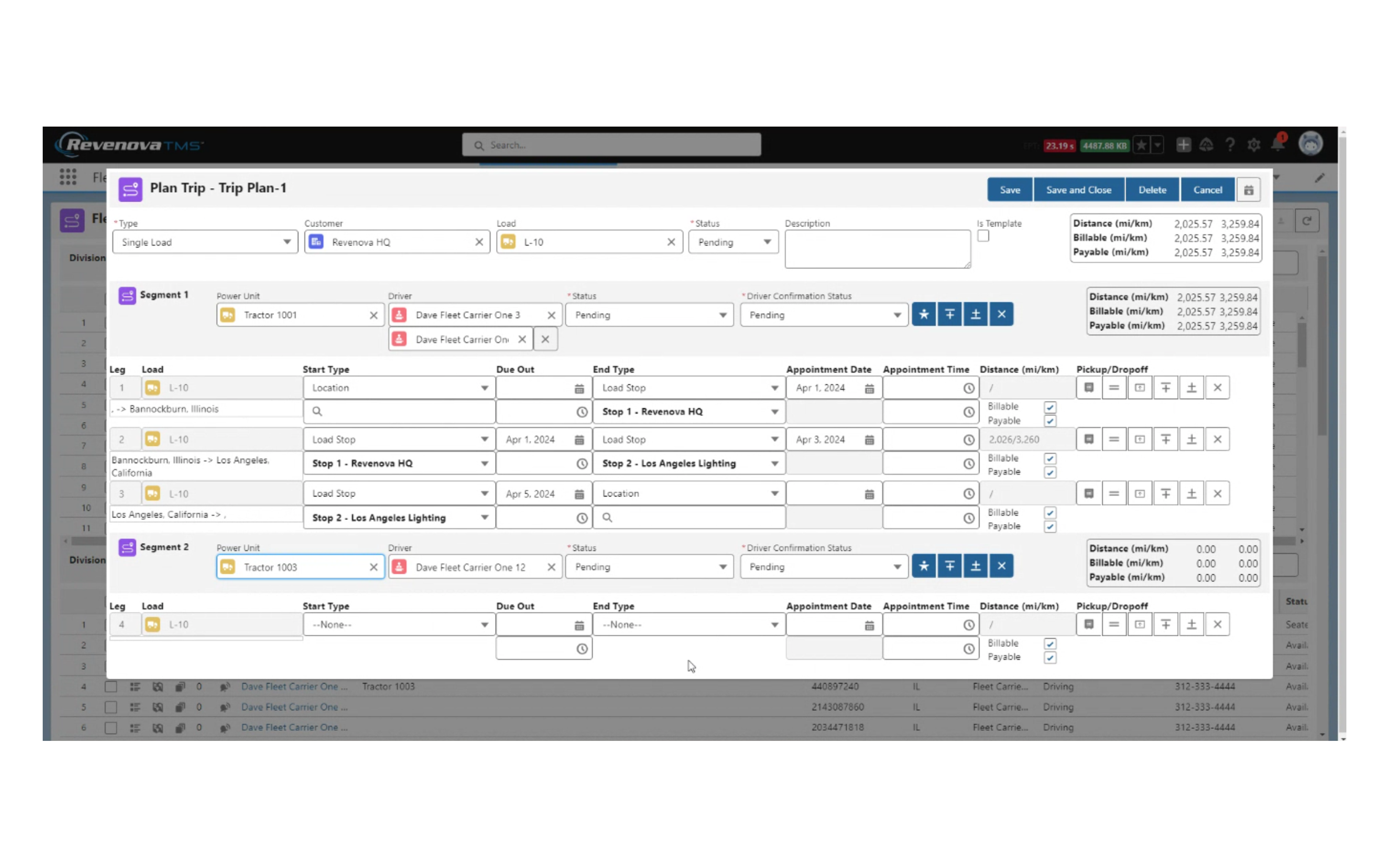
The modern TMS needs a customer relationship management tool
Many transportation companies still rely on disconnected systems to manage freight operations and customer relationships. This siloed approach leads to slower workflows, fragmented customer visibility, and difficulty aligning sales with service delivery.
The convergence of CRM for transportation companies and modern Transportation Management Systems (TMS) enables logistics businesses to close these gaps, elevate customer satisfaction, and operate more efficiently. Bridging these systems allows companies to eliminate information silos, unify workflows across departments, and create a single source of truth for both freight execution and customer engagement.
Before diving deeper into the importance of an integrated CRM and TMS, let’s review the basics.
What is a TMS?
A TMS, or Transportation Management System, is a logistics platform that helps manage the movement of goods from one location to another. It encompasses tasks such as load planning, carrier selection, and shipment tracking. Overall, a TMS enables businesses to streamline transportation operations and reduce costs.
A standalone TMS is powerful, but when combined with CRM functionality, it delivers unmatched efficiency across sales and service workflows. This integration empowers teams to align delivery execution with customer service goals, ensuring freight is not only delivered on time, but with the contextual insights needed to exceed client expectations.
For example, shippers using a TMS can reduce fuel costs and improve delivery timelines, but when integrated with CRM, they also gain full visibility into customer expectations and preferences, bridging the gap between operational performance and customer satisfaction.
What is a CRM?
A CRM system, or Customer Relationship Management system, is a technology solution designed to manage and analyze customer interactions and data throughout the customer lifecycle. It serves as a centralized repository for customer information, enabling businesses to track leads, manage contacts, streamline communication, and ultimately improve customer satisfaction and retention.
Unlike CRMs in traditional B2B sales, logistics CRM software focuses on managing freight customers, carriers, and complex multi-party interactions. A logistics CRM system allows for real-time insights into lane preferences, load history, and compliance needs—key factors in effective logistics customer management.
In a traditional CRM system, a sales team may track simple opportunities and pipeline stages. In contrast, a CRM software for transportation companies helps teams log pickup and delivery constraints, rate negotiations, and recurring lane bids—critical data for maintaining and growing customer accounts.
The Importance of CRM in Logistics
In the logistics company landscape, a CRM platform serves as a cornerstone for building and nurturing client connections.
- Lead Management: From prospecting new clients to tracking potential business opportunities, a CRM helps logistics professionals organize and prioritize leads. For example, a freight broker can use CRM software to track cold outreach and automate follow-up.
- Customer Communication: Business leaders find effective communication paramount in logistics. A CRM enables seamless interaction through email, calls, or load tracking portals. 3PL sales teams can personalize service updates and boost trust with shippers.
- Client Relationship Management: CRM tools help track shipper needs, from preferred pickup times to delivery feedback. Logistics CRM software enables proactive, white-glove service that deepens long-term loyalty.
- Carrier Relationship Management: Carriers are just as critical as shippers. A transportation CRM allows carrier sales reps to track preferred lanes, equipment types, and historical reliability—optimizing carrier fit and availability.
With CRM tools tailored to the transportation industry, businesses can build strategic partnerships, understand behavioral trends in customer routing, and maintain high service levels across every touchpoint. This leads to faster resolution of issues, more accurate service forecasting, and a measurable improvement in customer service across both shipper and carrier networks.
Why a TMS is Necessary in Logistics
Logistics success depends on precision. A TMS ensures the right load reaches the right destination on time and within budget. In today’s competitive landscape, TMS capabilities are essential. Companies that fail to modernize risk falling behind competitors who are leveraging TMS platforms to enhance efficiency, reduce costs, and deliver real-time transparency to customers and partners alike.
- Visibility and Tracking: A TMS helps logistics professionals plan routes using traffic, weather, and delivery schedule data. Real-time tracking provides transparency for shippers, reducing check calls and errors.
- Load Planning: Efficient load planning minimizes deadhead miles. Logistics companies can use CRM software and TMS tools together to match loads to the best-fit carriers and avoid missed revenue.
- Carrier Management: A TMS simplifies partner management by providing tools for carrier selection, performance monitoring, and contract management. This ensures that logistics professionals partner with reliable carriers, negotiate favorable rates, and maintain high service standards.
Without a TMS, transportation companies often rely on spreadsheets or manual updates—creating delays, increasing the chance of errors, and limiting visibility. A modern TMS ensures that all logistics decisions are data-backed, timely, and easily scalable. TMS capabilities are no longer idealistic—they’re a baseline requirement for operational resilience and scalable growth.
The Business Impact of a CRM-TMS Integration
A unified approach changes how transportation companies operate. The fusion of CRM implementation and TMS implementation leads to faster decisions, better service, and scalable growth.
- Streamlined Operations: With an integrated CRM and TMS, all customer and shipment data lives in one system. Carrier sales reps can view shipper feedback alongside delivery performance to make informed recommendations.
- Efficient Communication: Real-time updates flow between dispatchers, sales teams, and shippers. A shipper rep can pull CRM tool history and TMS load status to respond instantly to ETA inquiries.
- Data-Driven Decision Making: Combining CRM insights with TMS analytics gives leaders a full view of customer behavior, market trends, and service gaps. A 3PL manager can forecast demand and deploy resources more effectively.
Together, CRM and TMS provide actionable intelligence. Whether it’s identifying underperforming carriers, spotting churn risks based on engagement drop-offs, or improving lane pricing through historical rate analytics—CRM-TMS unification delivers insight that drives competitive advantage.
These are just a few of the transportation CRM benefits companies experience when they unify systems—better forecasting, improved service levels, and faster dispute resolution. Learn more about our Salesforce CRM for Logistics platform.
Who Benefits Most from Using a CRM?
While the benefits of a CRM extend across various industries, logistics professionals stand to gain significantly. This includes freight brokers, 3PLs, shippers, carriers, and other stakeholders such as customer and carrier sales reps, customer service personnel, and marketers involved in fleet management and supply chain management. By utilizing a CRM, these professionals can streamline lead management, enhance customer relationships, and optimize sales, marketing, and service efforts.
- Freight Brokers: Track shippers, quote faster, and optimize carrier coverage.
- Carrier Sales Reps: Match loads to preferred partners and automate follow-ups.
- Customer Service Teams: Improve first-contact resolution by referencing integrated CRM and TMS history, reducing callbacks and keeping clients informed at every stage.
- Logistics Executives: View pipeline trends and measure customer lifetime value.
- Dispatchers: Access customer preferences and notify clients of delays without leaving their workflow.
In many logistics companies, these roles rely on disjointed tools to perform time-sensitive tasks. A unified platform ensures every persona—from leadership to front-line reps—has consistent access to the data they need to perform effectively.
For example, a freight broker juggling dozens of shipper quotes can instantly access historical pricing, while a customer experience rep can view real-time delivery exceptions before picking up the phone. Meanwhile, dispatchers can coordinate loads with confidence, knowing they’re aligned with client preferences tracked in the CRM.
Challenges of Custom CRM-TMS Integration
While custom solutions may seem appealing, they often create barriers to long-term scalability.
- Complexity: Integrating different platforms often leads to sync issues, downtime, and IT bottlenecks. If your CRM and TMS are not native to each other, syncing them often requires third-party APIs or manual imports—both of which increase the likelihood of failure points.
- Cost: Maintenance, updates, and troubleshooting of custom tools can become cost-prohibitive for SMBs. The total cost of ownership grows over time as systems age and require more technical resources to stay aligned.
- Training and Adoption: A complex patchwork of systems reduces onboarding speed and increases user error. New hires must learn two platforms and the workarounds in between, making it harder to scale quickly and consistently.
- No Integrated Reporting: Without unified data, building actionable reports requires manual exports to data warehouses. This not only slows down insights but introduces discrepancies in reporting that can affect operational decisions. Consider instead a platform that offers CRM and TMS functionality in a single, native solution.
Why a Unified Platform Matters
A Salesforce-native TMS—like Revenova’s solution—solves the dual challenge of fragmented customer data and logistics operation coordination.
By combining the power of CRM and TMS into one intuitive platform, businesses:
- Eliminate silos across departments
- Reduce training and software costs
- Drive faster, more accurate decisions
- Deliver superior logistics customer management
Explore the benefits of TMS solutions designed to work seamlessly with CRM software. Request a demo today to see how Revenova helps transportation companies modernize operations with fully integrated CRM and TMS capabilities.




